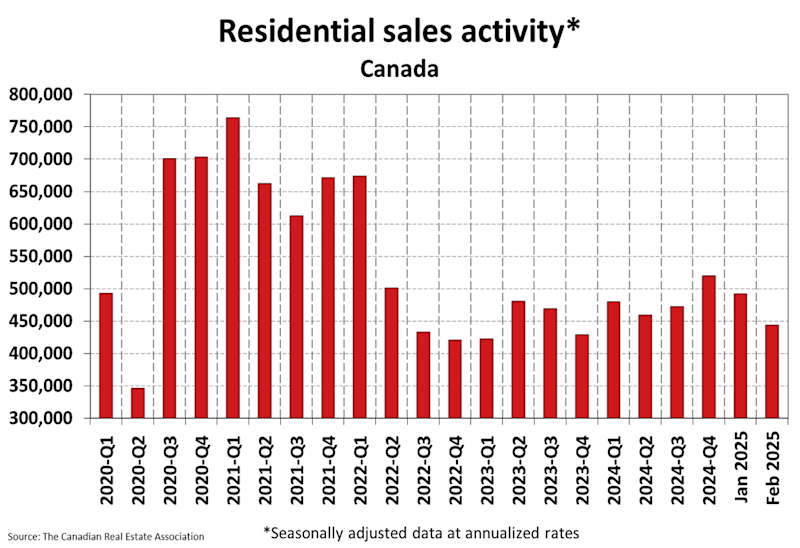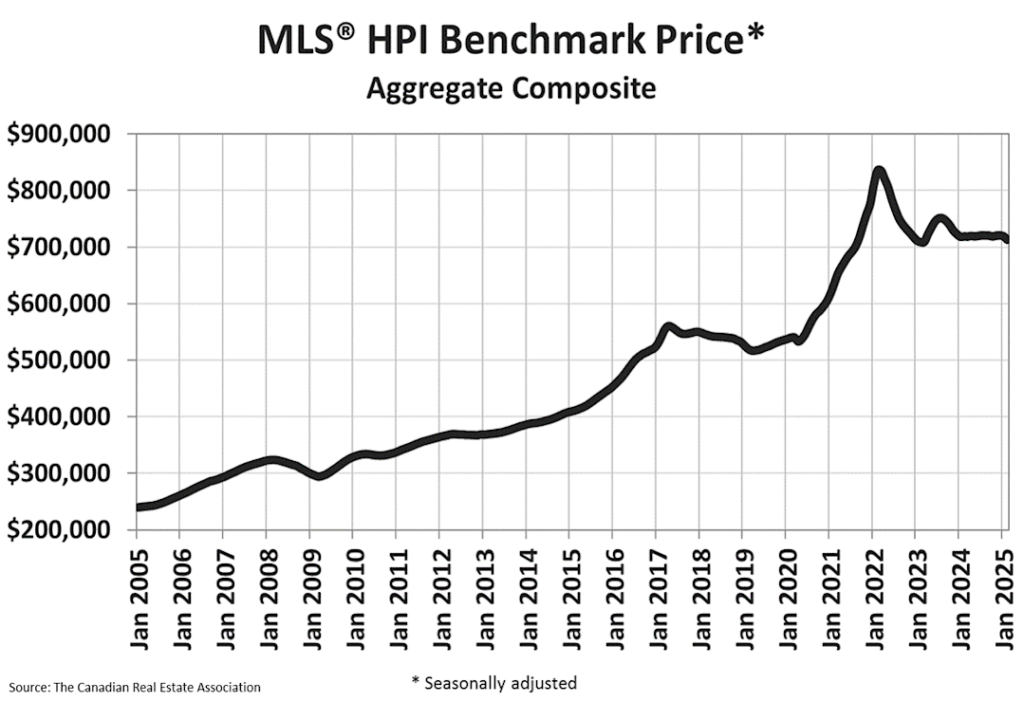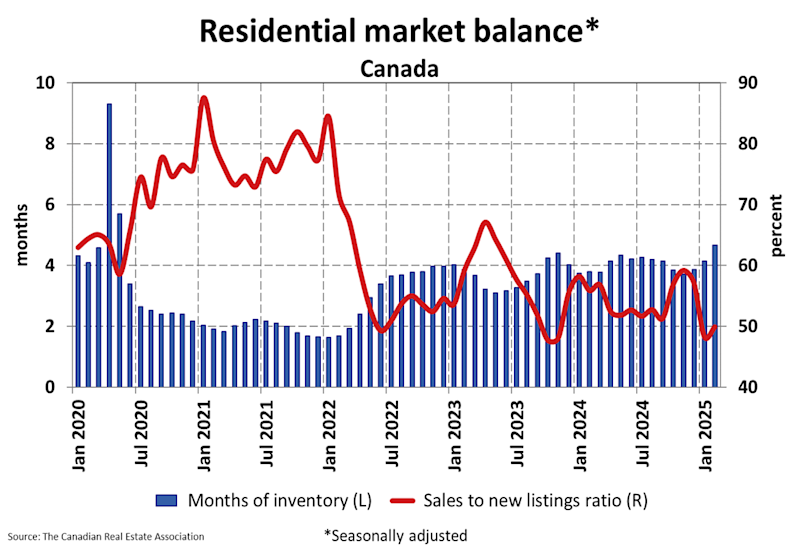Table of Contents
It looks like Canada’s once-unshakable housing market is finally hitting some turbulence. For years, it seemed like no matter what happened Canada’s housing market just kept chugging along. But The Canadian housing market forecast for 2025 is shifting, and February 2025 has delivered a reality check: home sales have taken a sharp dive, and many are wondering if this is the beginning of something bigger. Buying a house and selling a house are both becoming more complicated as home sales take a sharp dive, raising questions about whether this is the beginning of a broader downturn.
Is this surprising? Not really. The warning signs have been there for months, especially since the ongoing trade war with the U.S. started making waves. Canada’s housing market, like everything else, doesn’t operate in a vacuum. Economic uncertainty, job security, and consumer confidence all play a role in how people buy and sell homes. Right now, those factors seem to be combining into a perfect storm.
So, what exactly is happening, and what does it mean for buyers, sellers, and the broader market? Let’s break it down.
The Changing Landscape of Canada’s Housing Market
The Canadian housing market forecast has been signaling turbulence for months. Economic uncertainty, job security, and consumer confidence all influence how people approach buying a house in Canada and selling a house. Right now, those factors are aligning into a perfect storm, leaving buyers and sellers hesitant about their next move.
Homebuyers Are Slamming the Brakes
There has been almost a 10% drop in home sales from January to February – an undeniable sign that buyers are nervous. Historically, this time of year is when Canada’s housing market starts heating up for the busy spring season. Instead, we’re seeing a lot of people choosing to wait things out.
Why? Because uncertainty is powerful. With tariffs and trade disputes stealing headlines every day, potential buyers aren’t feeling confident about making one of the biggest financial commitments of their lives. Even in major hubs like Toronto and Vancouver, which have historically been strongholds in the Canadian housing market, there’s a noticeable slowdown.
CREA’s (Canadian Real Estate Association) Senior Economist Shaun Cathcart put it best: this pause isn’t shocking, but it’s significant. When people feel unsure about the future, they don’t rush to sign mortgage papers.

Home Prices Are Starting to Slide
As demand declines, prices are also beginning to dip. The housing market outlook shows that the MLS Home Price Index (HPI) dropped 0.8% from the previous month—the largest decline since December 2023. Year-over-year, the HPI is down 1%, while the national average sale price has fallen by 3.3%.
For some, this might seem like an opportunity. Buying a house in Canada could become more accessible for first-time buyers after years of relentless price increases. But there’s another side to the story: price declines driven by economic fears aren’t exactly the same as price drops due to increased affordability. If buyers are too worried about their financial stability to take advantage of lower prices, then a slowdown in the market can quickly turn into something more serious.

Sellers Are Holding Back Too
It’s not just buyers stepping back; sellers are also rethinking their moves. In February, new listings fell by 12.7%, wiping out the unexpected surge seen in January. Fewer homes are on the market, helping maintain balance. But with both buyers and sellers waiting, Canada’s housing market is in an unusual equilibrium.
Currently, the sales-to-new listings ratio is sitting at 49.9%, indicating a balanced market. However, it’s a fragile balance – if either side loses confidence further, things could tip one way or the other.

Inventory Is Rising, But That’s Not Necessarily a Good Sign
One key metric to watch in the Canadian housing market forecast is inventory. Right now, the number of months of inventory has increased from 4.1 to 4.7. Typically in a more stable market, more inventory means more choices for buyers and a less panic-strickened buying experience.
But the thing is, the rise in inventory isn’t because sellers are flooding the market; it’s because buyers are holding off. If homes start lingering on the market longer, we could see more price reductions, which in turn could trigger a broader correction.
Again, lower prices sound good in theory, but if they’re dropping due to fear and uncertainty rather than an organic market shift, that’s not a great sign for anyone.
Buyer Psychology Is the Real Issue
Beyond economic factors, psychology plays a big role in real estate trends. Right now, a growing sense of caution is shaping the housing market outlook just as much as interest rates and employment numbers. And that hesitation is driving the market slowdown as much as any economic indicator.
James Mabey, Chair of CREA, points out that many buyers are worried about making a big financial commitment in uncertain times. And who can blame them? When headlines are filled with warnings about trade wars, layoffs, and inflation, people start second-guessing major purchases.
This hesitation can become a self-fulfilling prophecy – if enough buyers wait, prices drop further, fueling even more uncertainty and leading to more delays in buying a house. It’s a tough cycle to break.
What Happens Next?
So, is this just a temporary dip, or is the Canadian housing market forecast pointing to a larger downturn? While no one knows for sure, here are a few critical factors to watch:
Interest Rates – If the Bank of Canada lowers rates to stimulate the economy, buyer confidence may return. If rates remain high, the market could continue its sluggish trajectory.
Job Market Stability – Rising layoffs due to economic uncertainty will deter buyers, deepening the slowdown in Canada’s housing market.
Trade War Developments – If Canada and the U.S. resolve their trade tensions, economic confidence could bounce back, pulling buyers back into the market. If tensions escalate, uncertainty could persist.
What Should Buyers and Sellers Do?
For those considering buying a house in Canada, this could be an opportunity. Prices are softening, and buyers might have more negotiation power than in previous years. However, job security and financial stability should be top of mind before making a move.
For sellers, now might not be the best time to list unless you truly need to. With fewer buyers in the market, achieving top dollar for a home could be challenging. If possible, waiting to see how Canada’s housing market evolves over the next few months may be the best strategy.
Final Thoughts
The Canadian housing market forecast suggests that while the market isn’t crashing, it is in flux. Economic uncertainty is weighing heavily on both buyers and sellers, shifting Canada’s housing market from the red-hot conditions of recent years to something much more cautious and measured.
The key takeaway? Stay informed and adaptable. Whether you’re buying a house, selling your house, or simply watching from the sidelines, understanding the factors at play will help you make the best decision.
And one of the best ways to do that is to attend our next Market Call. Canada’s real estate landscape has entered uncharted territory. But you don’t have to navigate it alone.
Join us online on March 25 at 12 PM Eastern. Co-host of Canada’s #1 real estate podcast and Valery’s Chief Real Estate Officer, Daniel Foch will share his insights on the latest housing market stats, market slowdowns, and what strategies you should be using to navigate the market.
